Reviews
Michael Tolkin
USA, 1991
Credits
Review by Abbey Bender
Posted on 27 August 2013
Source New Line DVD
Related articles
Reviews
The Rapture by Rumsey
Categories Favorites: The Apocalypse
The opening shot of The Rapture introduces an ominousness that will pervade the film’s remainder: the camera pans slowly over rows of dreary cubicles that are filled with shadows. It arrives at a single woman, Sharon, who’s outfitted in a telephone headset. She addresses an endless influx of callers without variation, asking, “Is that a business or residence?” over and over again. The routine is so redundant that we suspect Sharon will need some sort of release.
This release initially comes from a regimen of sexual encounters in which she and her smarmy partner, Vic, engage. They cruise airport bars on the hunt for swinger couples keen on the pair’s brand of carnal shenanigans. In their first outing they meet Randy and his date, with whom they enjoy some empty sex at a furniture store, and we wonder how much satisfaction Sharon really derives from such a rendezvous.
Sharon begins to see Randy for sex more regularly, and begins to open up to him emotionally. After one of their liaisons, Sharon talks of the void she feels in her life, the fact that “a day is always just over” without any lasting satisfaction. Randy takes this as a sign of Sharon’s depression, and suggests she see a therapist. She scoffs at this idea, and, as if on cue, the next morning she’s visited by two Jehovah’s Witnesses preaching “a personal relationship with the Son of God.” Initially apprehensive, she ends up taking the free bible they offer, and soon after kicks Randy out of bed and offers up a revelation both desperate and relieving: “I’m starting over. I need a new direction in my life. There is a God, I know it.”
Sharon’s religious faith lacks the optimism we may expect, given the film’s aggressively dark tone. She could easily be presented as a Mary Magdalene figure, but the gloominess of the film leads us to believe that things will end tragically for Sharon, despite whatever new positivity her faith may incur. Sharon is desperate to find meaning, to absolve her past sins and to reassert her direction in life. In a hotel room, with a curtain casting a sickly red glow behind her, Sharon holds a gun to her head. She doesn’t pull the trigger, choosing instead to reach for her bible. On the soundtrack, a muffled “I’ll Be Your Mirror” can be heard. We don’t see which passage she reads, but as the shot moves into a close-up, her face relays a look of serenity. The choice of music is telling—now God is Sharon’s mirror. Her new faith has motivated her to reevaluate herself, so that she may continue her journey of self-betterment. Instead of destroying her reflection with a gun, Sharon has chosen to view it more positively by settling on the Christian way of life.
Enigmatic religious imagery had already been weighing heavily on Sharon’s mind. Earlier in the film, Sharon was transfixed by an elaborate tattoo on the back of a mysterious, soft-spoken female playmate chosen by Vic on one of their regular trysts. Part of the tattoo’s intricate design includes the pearl—a pure, shining orb that Sharon sensed had some significance, and had already heard her coworkers discussing in hushed reverent tones. Sharon’s conversion is spurred in part by her longing to see the pearl for herself, and experience the deep faith that it symbolizes. She finally sees this icon in the “I’ll Be Your Mirror” sequence. Choosing the bible over the gun, she is rewarded with this glowing symbol that unites those who believe. In the next scene, Sharon appears happy - replenished, even - and tells Vic that she has found God and been rewarded with His comforts. Vic is expectedly incredulous, and Randy mocks her new faith, calling it a drug. However, he still embraces her, and asks if she’d stay with him for the night even if he doesn’t pray.
At the film’s mid-point, the story jumps ahead six years: Sharon and Randy are now married with a young daughter. Despite the couple’s apparent contentment, the proceedings are still ominous—seated in their church, they bear witness to a boy prophet who gravely warns that the rapture is coming within the year. Here, the film’s title - heretofore a description of Sharon’s carnal desires - inherits its second, more conclusive meaning.
Religion must have bequeathed Sharon with a deep sense of forgiveness, as we learn early on that Randy once committed murder in exchange for money. The power of religion proves strong for Randy too: believing that the end is imminent, he can gaze meaningfully at his wife, content in the knowledge that he has been forgiven and will be saved. We may not see the evolution of Randy’s conversion, or any of his and Sharon’s domestic drama as a pious couple, but perhaps just witnessing the extent to which they have taken on an outwardly Christian identity (their daughter is named Mary, and their bedroom is filled with religious paraphernalia) tells us enough.
Conversion does not make Randy immune to tragedy, however. In an act that shows religion’s fallibility in making invincible its followers to events both awful and jarring, Randy is fatally shot in his office by a rampaging worker. Sharon and Mary are left grasping for a way to cope in the wake of such great loss. Grief-stricken, Mary talks of heaven and asks if her father is there, serving as a sort of mouthpiece for her mother’s beliefs and doubts. Spurred by sadness, frustration, and their faith, mother and daughter flee to the desert, where they intend to wait for the rapture and to be reunited with their husband and father.
The wait becomes intolerable, so much so that Mary screams that she wants to die in order to accelerate her reuniting with her father. Sharon attempts to absolve her daughter’ pain in an act of extreme desperation and helplessness, and shoots Mary with a revolver. The magnitude of this action defeats Sharon, and she puts the gun to her own head before rationalizing that suicide would prevent her entry into heaven.
One of the chief messages of The Rapture is that both those believers and non-believers are capable of horrible acts. When Randy committed murder he was an atheist, and considered his crime as a means to an end because he needed money. Sharon, contrarily, killed in a desperate effort to absolve her daughter’s suffering. “How can I love a God that let me kill my baby?” she asks in response. God equipped Sharon with a direction in her previously aimless life, but her untenable desire for salvation made her conviction so fierce that she committed an act any mother would find heartbreaking.
As Sharon recovers from her violent actions, she is both mystified and relieved by the sound of horns and the appearance of the horsemen of the apocalypse. The desert becomes bathed in an ethereal blue light and everything is covered in fog, until darkness settles and Mary reappears. With maddening childishness, she tells her mother, “We’re not in heaven. Heaven’s over there”—she is in a sort of metaphysical waiting room from which heaven can be glimpsed. Mary pleads with her mother, begging Sharon to declare her love for God in a final call for redemption. Sharon agonizes, and admits to the apparition that she can’t do this. “Don’t you know how long you have to stay here?” Mary asks, before being spirited back into the darkness. “Forever,” Sharon responds, conclusively damning herself to the waiting room. The composition encloses Sharon’s face as she says this, and slowly pulls back, isolating her, the sole figure in a great expanse of darkness.
In this manner the apocalypse is not presented as a mania of special effects. But in Sharon’s mind, and as with the tradition of apocalypses in movies, the event is expected to be a cataclysmic one. Instead, the rapture culminates in nothingness. Sharon stands in resignation, in protest to what she perceives is God’s betrayal, and alone, in great despair, for all eternity.
More Favorites: The Apocalypse
-
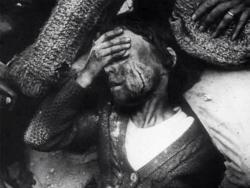
The War Game
1965 -
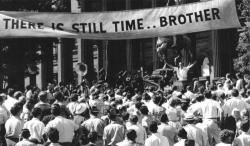
On The Beach
1959 -
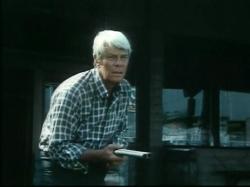
Where Have All the People Gone
1974 -

A Boy and His Dog
1975 -
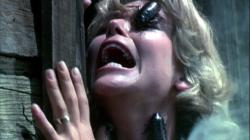
Bug
1975 -
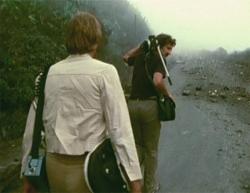
La Soufrière
1977 -
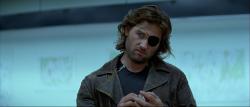
Escape from New York
1981 -
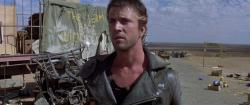
The Road Warrior
1981 -
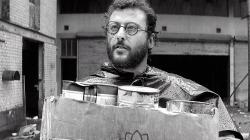
Le Dernier Combat
1983 -
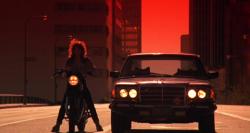
Night of the Comet
1984 -

Threads
1984 -
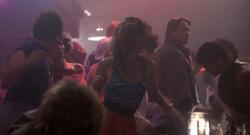
The Terminator
1984 -
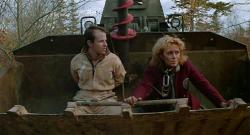
Def-Con 4
1984 -
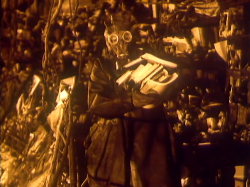
Letters From a Dead Man
1986 -
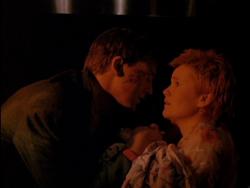
Miracle Mile
1988 -
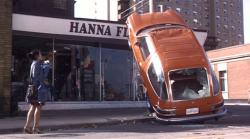
Last Night
1988 -

Last Days
2005 -
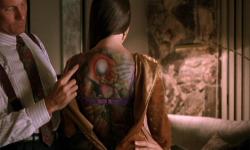
The Rapture
1991 -

Southland Tales
2006 -

Idiocracy
2006 -
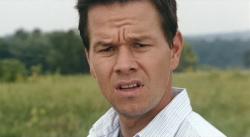
The Happening
2008 -
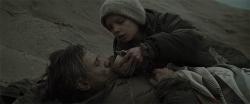
The Road
2009 -
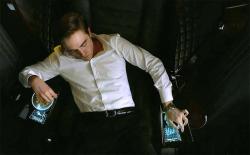
Cosmopolis
2012
We don’t do comments anymore, but you may contact us here or find us on Twitter or Facebook.



